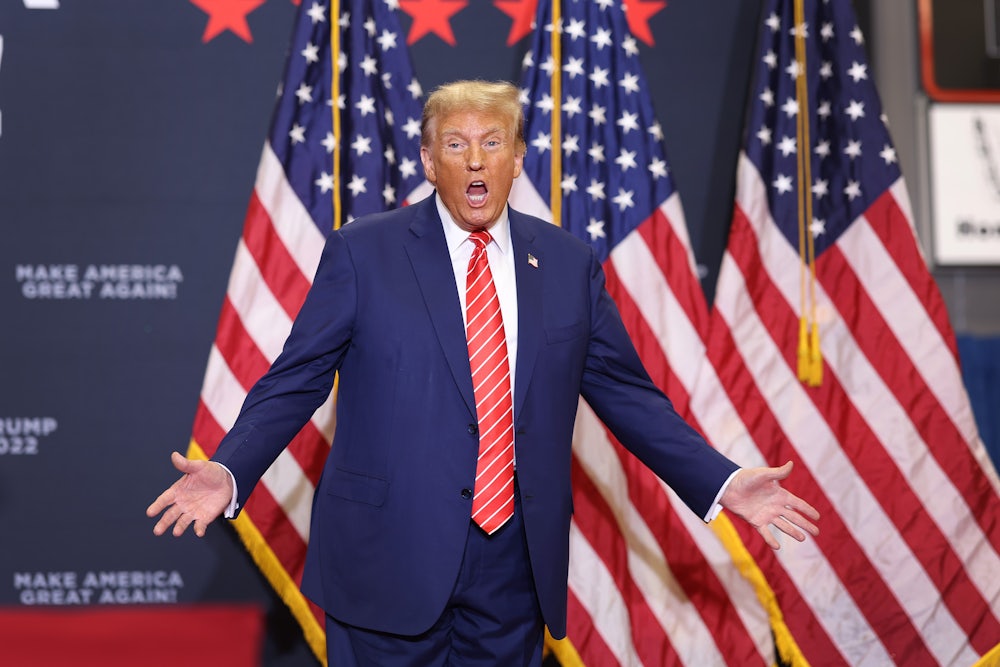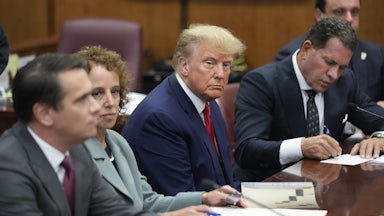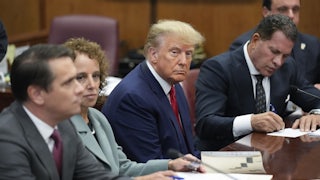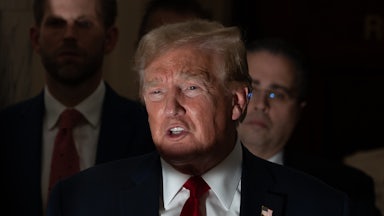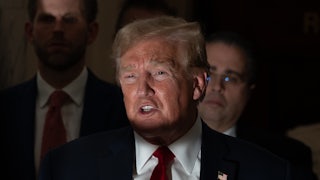Donald Trump and his lawyers are making an extraordinary demand in the D.C. Circuit Court of Appeals: They want Trump granted immunity from criminal charges related to his subversion of the 2020 election, because the actions were undertaken while he still occupied the White House.
This has been widely depicted as a Hail Mary effort to scuttle special counsel Jack Smith’s prosecution of Trump for conspiracy to obstruct the official proceeding of Congress’s count of presidential electors—otherwise known for nearly 250 years in this country as the peaceful transfer of power.
But there’s another way to understand Trump’s move: It’s about what comes next. If he wins on this front, he’d be largely unshackled in a second presidential term, free to pursue all manner of corrupt designs with little fear of legal consequences after leaving office again.
That Trump might attempt such moves is not idle speculation. He’s telling us so himself. He is openly threatening a range of second-term actions—such as prosecuting political enemies with zero basis in evidence—that would almost certainly strain the boundaries of the law in ugly new ways.
Now imagine him pursuing this project with a get-out-of-prosecution-free card in his pocket. “It really would permit him to be completely unconstrained if he were reelected,” Neil Eggleston, who served as White House counsel under President Barack Obama, told me.
To be sure, Trump has a weak case, as legal experts point out. The Justice Department has a long-standing policy against prosecuting sitting presidents, and the ex-president’s lawyers cite civil law precedent to claim that Trump’s acts were within the “outer perimeter” of presidential duties, and thus immune from criminal prosecution after he left office. If not, they suggest, future presidents will be constrained in office by fear of nakedly political prosecutions later.
But special counsel Jack Smith counters that presidents do not “operate in a realm without law,” that granting Trump’s request would “license presidents to commit crimes,” and that his criminal efforts to overthrow democracy don’t fall within the “outer perimeter of official presidential responsibilities” to begin with.
Smith is likely to prevail. The three-judge panel includes Michelle Childs and Florence Pan (appointed by President Biden) and Karen Henderson (appointed by President George H.W. Bush). So it doesn’t appear to be a Trump-friendly panel. But what if the court does side with Trump?
It’s been said on social media that if Trump wins here, his second-term powers would be quasi-absolute—that he could order, say, the assassination of political foes with impunity. That overstates the matter. As former White House lawyers told me, if Trump prevails, the courts will likely affirm that actions within the “outer realm” of official duties are immune to prosecution, not that any actions (such as assassinations) are.
But a favorable decision could still unshackle Trump in a big way. Trevor Morrison, associate White House counsel under Obama, says the key is whether the courts rule that Trump has immunity on the theory that his alleged criminal conduct does fall in the outer perimeter of presidential duties—and how the courts define that perimeter. If they accept Trump’s broad version of immunity or something like it, he might argue that future potentially criminal acts also fall within that perimeter.
For instance, could a victorious President Trump urge the FBI to investigate Georgia prosecutor Fani Willis, who has also criminally charged Trump, and order the seizure of documents related to those charges to sabotage her effort? That would be similar to Trump’s corrupt pressure on the Justice Department to fabricate a pretext for halting the January 6, 2021, electoral count.
Or in the 2026 battle over the Senate, could President Trump threaten elections officials with prosecution while pressuring them to “find” votes in a decisive contest? After all, he arguably did just this with the Georgia secretary of state.
Trump justified his pressure on Justice Department officials and Georgia’s secretary of state by claiming he was combating corruption. If Trump wins now, it might give him room to claim later that turning loose the FBI on Willis or pressuring elections officials in 2026 also constitute carrying out presidential duties to fight corruption, Morrison noted.
“If he is found immune from these charges, there is at least a great risk that the courts will have endorsed an immunity that could cover a number of otherwise criminal things the president might do in the future,” Morrison said. Similarly, Cardozo Law School professor Kate Shaw suggests a ruling for Trump could encourage him to abuse his powers to purge the civil service and invoke the Insurrection Act to target all manner of domestic enemies.
Kristy Parker, counsel at Protect Democracy who served as a lawyer in multiple administrations, notes that Trump has signaled clear intent to do exactly this sort of thing. He has attacked Willis’s prosecution of him as corrupt, hinted at full-scale persecution of “vermin” Americans who oppose him, and openly threatened to prosecute President Biden as retribution. “If I don’t get immunity, then Crooked Joe Biden doesn’t get immunity,” Trump recently raged.
In saying this, Trump essentially declared that if he is denied immunity, he will prosecute Biden on a fake finding of corruption, just as he invented corruption as a pretext for his alleged election crimes. What happens if those efforts to name and target fabricated corruption are in some sense deemed official acts?
“Trump has threatened to use the presidency to punish enemies, reward friends, and protect himself,” Parker told me. “If the courts recognize immunity for the broad array of official acts of the presidency, that will incentivize Trump to abuse those powers further.”
Parker doubts the courts will side with Trump. “But the very nature of his claim further underscores his extreme view of the presidency as being completely above the law,” Parker said.
There’s a strange tendency in our “LOL nothing matters” discourse to treat Trump as fearless and invulnerable in his corruption and (alleged) lawbreaking. In reality, Trump fears prosecution and accountability. As special counsel Robert Mueller’s report on the Russia scandal documented, he took extensive steps to ward off that possibility, bullying his attorney general, trying to get Mueller fired, and ordering an underling to deny that effort.
He was so eager to avoid legal consequences that he might have criminally obstructed justice to avoid it. These fears didn’t stop him from transforming his first term into an extraordinary spree of corruption, self-dealing, and likely criminality, including trying to destroy lawful constitutional democracy, but he and his allies have taken extensive steps to cover it all up throughout.
It’s sobering to imagine what Trump might be capable of during a second term—if it’s decisively confirmed to his satisfaction that the law will not apply to him after all.
